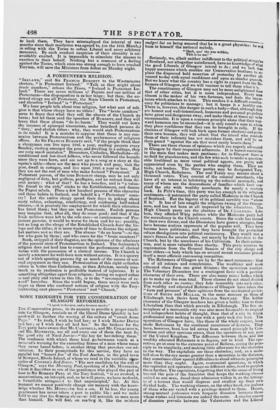A FOXHUNTER'S RELIGION.
"IRELAND," said Sir FRANCIS BURDETT to the Westminster electors, "is Protestant Ireland." "Talk as they might about brute numbers," echoes the Times, "Ireland is Protestant Ire- land." There are seven millions of Papists and one million of Protestants—the disproportion is raiher large ; but then, the en- dowed clergy are all Protestant, the State Church is Protestant, and therefore "Ireland" is "Protestant."
We hear people talk about true religion, but what sort of reli- gion is that whose clergy have no tithes? The "brute numbers" seem to fancy that what they call the abuses of the Church do harm ; but let them read the speeches of BURDETT, and they will learn that these abuses "do no harm." They would cut down the incomes of episcopal sinecurists, make beneficed parsons do " duty," and abolish tithes: why, they would stab Protestantism in its vitals! It is a mistake to suppose that there is any con- nexion between Protestantism and the performance of religious offices. As Sir FRANCIS BURDETT said, "if the people think that a clergyman can live upon 2001. a year, reading prayers every Sunday, visiting amongst the poor, and dwelling in a cottage, they are very much mistaken." Dissenters, Catholics, Methodists—ill- conditioned and low-lived fellows, who never followed the hounds since they were born, and are not up to a song or a story at the squire's table—these are the men who preach and pray, visit the poor, dwell in cottages, and live upon 2001. a year or less. But they are not the sort of men who make Ireland "Protestant." A Protestant parson, of the true BuersErr stamp, may be not only negligent of duty, but godless, profligate, and an outcast from de- cent society : what of that? he has a benefice, and is "a valua- ble friend to the rich," sticks to the Establishment, and damns the Papist rebels. Place a few hundred persons of this character and these habits in Ireland, and behold it a "Protestant" coun- try! Let the native clergy spend their days in poking about nasty cabins, exhorting, comforting, and confessing haltnaked siuners,—it is precisely the employment for which their education bus fitted them ; but they are not Protestants. Foolish persons may imagine that, after all, they do some good; and that if the Irish millions were left to the sole care—or carelessness—of Pro- testant parsons, it would be worse for them and for us : possibly, but as long as the clergy of the Established Church hare the liv- ings and the tithes, it is mere waste of time to discuss the subject. Let matters rest as they are. The abuses "do no harm"—to the few who gain by them; and who cares for the "brute numbers?"
Such, stripped of their disguise, are the opinions of the admirers
of the present state of Protestantism in Ireland. The foxhunter's religion does not lead him to connect the performance of clerical duties with the possession of a clerical income. The Church is merely a resource for well-born men without estates. It is a quarry out of which sporting parsons dig as much of the means of sen- sual enjoyment as they can. Protestantism of this right orthodox colour is better than Catholicism, or than Atheism, merely inas- much as its profession is profitable instead of injurious. It is something altogether apart from religion ; having no regard either to real piety and virtue in this life, or to the "recompense of re- ward" hereafter. Since the world began, there never were such dupes as those who confound notions of religion with the Tory- foxbunting cant phrases "Protestant" and "Church."


























 Previous page
Previous page